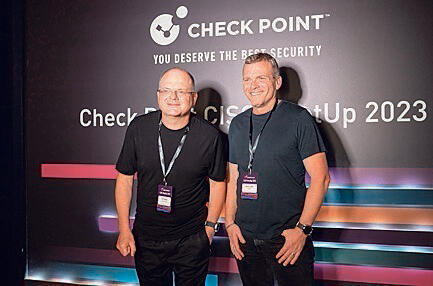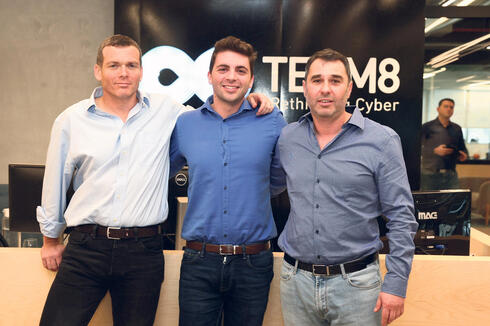
Check Point's X-Factor: Can Nadav Zafrir wake the sleeping giant?
Despite never completing an officer's course, lacking formal tech training, and having no sales experience, former 8200 commander Nadav Zafrir is now leading Check Point—driven by a belief he can close the gap with Palo Alto.
Nadav Zafrir was always the unexpected appointment. The new CEO of Check Point, who took office about six months ago, wasn’t the obvious choice when Gil Shwed — the company’s founding and long-standing CEO — announced his retirement.
But Zafrir is used to that. At just 30 years old, he was parachuted into the role of deputy commander of Unit 81, the elite technological division of the IDF’s Intelligence Corps, straight from his position as a field officer in Sayeret Matkal. Along the way, he bypassed many qualified candidates who had seen themselves as natural successors. Five years later, he repeated the feat, moving from 81 to become deputy commander of Unit 8200 — and four years after that, he was appointed to lead the entire unit.
Somewhere along the way, people even forgot a “minor” detail on his résumé: Zafrir had never taken the IDF’s officer training course. According to a widely circulated — and likely accurate — story, Moshe “Bogie” Ya’alon, then commander of Sayeret Matkal, once summoned Zafrir to a high-level meeting. When he asked him to wear formal uniform for the occasion, he was surprised to discover that Zafrir was technically a non-commissioned officer. A quick decision was made to grant him officer status on the spot. Two decades later, Zafrir retired from the IDF with the rank of brigadier general — and the rest, as they say, is history.
Check Point investors were initially surprised by the appointment but quickly embraced it with enthusiasm. Before Trump’s tariff policy shook the markets, the Israeli cybersecurity giant’s stock was enjoying an uptick — due in no small part to Zafrir’s reputation and the belief that he was exactly the kind of bold change a conservative, 30-year-old company needed. From the announcement of his appointment in July until he officially stepped into the CEO role in December, the stock rose 12%. Since then, it has continued to climb, up 22% in total, bringing Check Point’s market value to $22.5 billion — just below its all-time high of $25 billion reached last month.
So, who is the man now steering one of Israel’s largest tech companies, a company some believe could become — with the right leadership — a $100 billion giant?
If you asked an AI to generate an image of a “classic Israeli cyber leader,” odds are the result would look a lot like Zafrir. That’s part of the investor excitement. But just like the officer’s course he never took, there’s another detail people seem to forget: Zafrir, now running a company with annual revenues exceeding $2.5 billion, has never closed a single sales deal. He might be excused for this if he were a technological genius — but he doesn’t come from a tech background, nor is he a programmer.
Still, it’s hard to find anyone in the Israeli tech ecosystem who sees his unusual appointment as a mistake. Conversations with senior figures in the industry and those who served with Zafrir in the military paint a clear picture: what he lacks in conventional qualifications, he more than makes up for in charisma and extraordinary interpersonal skills. The phrase heard most often when his name comes up? “He has the X factor.”
$3 billion in cash reserves
“Nadav brings a rare combination of being both super smart and genuinely kind. A lot of people like him, even though he’s direct and says things exactly as they are — even when it’s unpleasant,” says the CEO of an Israeli high-tech company who knows him well. The industry also respects Zafrir simply for taking on the role: “His appointment surprised everyone. People are saying it will either be great or a disaster,” says a senior executive at a cybersecurity company. “Check Point is a complex company. It has an innovation problem. It doesn’t have the best talent in the market today, but on the other hand, it has a lot of cash in the bank,” he adds, referring to the company’s $3 billion in cash reserves.
“I—and the entire industry—respect Nadav for accepting the position, because Check Point isn’t exactly in a good place. There’s a very active and dominant chairman there,” says a partner at a venture capital fund, referring to Gil Shwed. “A serious turnaround is needed, and it’s going to take several years of very hard work. He didn’t need to do this—certainly not for financial reasons, since he has a military pension and has already made significant exits through the Team8 fund he founded and led. And not for his résumé, which is already full. It’s honestly hard to understand why he took this on. The main story will be the clash of egos between him and Shwed.”
The phrase “clash of egos” comes up in nearly every conversation about Zafrir’s arrival at Check Point. Shwed, who co-founded the company that arguably founded the cybersecurity industry back in 1993—alongside Shlomo Kramer and Marius Nacht—ran it for three decades with a distinctly conservative approach. On one hand, it remains the most profitable company in the sector. On the other, its slow growth is reflected in its relatively modest market valuation and low multiples compared to competitors.
Palo Alto Networks, which was founded much later, has already crossed a $100 billion valuation. The recent $32 billion sale of Wiz to Google makes the five-year-old Israeli startup more valuable than Check Point.
Check Point introduced the firewall—technology that revolutionized remote access security in the late 1990s and early 2000s—but over time, its relevance waned. Over the past decade, Check Point has barely grown. Only recently has it begun to show signs of recovery, with single-digit annual growth, following pressure from investors and a prolonged stagnation in its stock price—at a time when the global cybersecurity market has surged, both in valuations and in demand for innovative solutions.
Check Point’s failure to lead in cloud security helped pave the way for Wiz’s rise. Shwed didn’t recognize the cloud transition early enough and didn’t move fast to adapt the company’s offerings. Palo Alto Networks closed that gap through a series of major acquisitions. Shwed, by contrast, remained conservative, making small acquisitions that in retrospect didn’t move the needle.
Ironically, just weeks before the Google-Wiz deal was announced—and as Zafrir’s first major move—Check Point signed a partnership with Wiz. In that agreement, the veteran firm effectively admitted it had failed to build a competitive cloud security product and would instead bundle Wiz's offering to its customers. With the Google acquisition looming, the future of that partnership is unclear. Zafrir may now need to find a creative way to solve Check Point’s central challenge.
Zafrir comes from a very different world than Shwed. His background is either in the IDF—an organization backed by deep state resources—or in venture capital, where the emphasis is on rapid growth rather than profitability. Shwed is, first and foremost, a technologist. Zafrir is a businessman. “They both have very big egos,” says a senior figure in the Israeli cybersecurity ecosystem who knows both men well, “but generals tend to be more like politicians—they know how to maneuver, they’re more flexible. Nadav really wants to succeed, and he’s made it a personal mission not to clash with Gil. The one who could spoil that balance is Gil—especially if he feels the baby he built is under threat. After all, he still owns 25% of the company, which is highly unusual on Wall Street.”
Not shy about asking technical questions
Shwed is indeed Check Point’s largest shareholder, with a stake now worth billions of dollars—growth he largely owes to Zafrir’s impact over the past year. Zafrir understands the limitations of the sector at this stage, and anyone who has visited Check Point knows that his office is essentially a spacious conference room, where he holds non-stop meetings with employees from across the company. It’s said that the room has no personal desk—just a long conference table on one side and a sofa on the other.
Not far from that conference room is Shwed’s own office, where he still shows up two to three times a week. Although Zafrir has already initiated several personnel changes at the top of the company—and is reportedly planning further shifts, particularly in marketing and sales—he is still frequently seen conversing with Shwed in the hallways or in the chairman’s office.
Those who have worked with Zafrir throughout his career say he is never shy about asking questions when he doesn’t fully understand the technological details—even if everyone else in the room nods along in apparent comprehension. At times, he sits with engineers or technologists one-on-one to grasp exactly what’s being discussed.
Within Check Point, two of Zafrir’s key weaknesses are frequently cited. But insiders also point to his willingness to listen and learn. “Zafrir has always benefited from the aura of having commanded Unit 8200, the IDF’s legendary intelligence unit, but he lacks deep technological expertise—and that’s where Shwed’s guidance is critical,” say those close to the company. “And on the business side, he has less experience with sales than even many startup CEOs. He doesn’t know what it’s like to close deals under the pressure of an end-of-quarter deadline.”
Still, not just within Check Point, but across the entire Israeli cybersecurity industry, many are betting on Zafrir’s “X factor” to drive eventual success. What would count as success? As Zafrir himself said at his first press conference after taking the role: “If I didn’t think Check Point could close the gap with Palo Alto, I wouldn’t have taken the job.” It was a bold declaration, setting an almost impossible goal—to close a $100 billion valuation gap and a $10 billion revenue gap.
Team8: The startup that creates startups
Nothing in Zafrir’s childhood hinted at a future in cybersecurity. He descends from the founding families of the kibbutzim Ma’ale HaHamisha and Kiryat Anavim in the Jerusalem hills. The middle child between an older sister and a younger brother—now a biology PhD and educator—Zafrir was born in Kiryat Anavim. He spent much of his childhood in South America, where his father, a dairy farmer, was posted to share Israeli agricultural know-how in countries like Ecuador and the Dominican Republic.
In 1988, Zafrir returned to Israel to enlist in the IDF, with no ambitions of a military career—certainly not in tech or in Unit 8200. Unlike Gil Shwed, who was programming from childhood, Zafrir wasn’t a computer geek. He began in the Paratroopers Brigade and later volunteered for Sayeret Matkal, the IDF’s elite reconnaissance unit. There, he served as a combat soldier and commander—and met his future wife, Maya Eisen Zafrir, then an officer. Today, she heads LeumiTech, the tech-focused division of Bank Leumi, responsible for ties with startups and tech companies in Israel.
Another urban legend—one that’s probably true—says it was Eisen Zafrir who first came up with the idea for Team8, the venture fund that built Zafrir’s post-army reputation.
After retiring from the IDF, Zafrir entered the tech world and in 2014 co-founded Team8 with Israel Grimberg and Liran Grinberg. The three had all served in Unit 8200 and shared a vague ambition to build something together, though they lacked a concrete idea. Their vision was to create a startup that creates startups—an innovation engine based on collective intelligence. But their early pitches to Israeli investors met with rejection.
The turning point came at a café in Herzliya Pituach. Eisen Zafrir happened to overhear a conversation about the need to promote Israeli cyber innovation. She took the phone number of one of the people speaking—Yuval Shachar, now chairman of Team8 and the fund’s first investor. Since then, Team8 has raised $1.2 billion.
Today, from Check Point’s offices in Tel Aviv, Zafrir can still see the Team8 offices in the Tel Aviv Towers. From another window, he can see the tower increasingly dominated by Palo Alto Networks—and also the building housing Wiz, now part of Google. His past triumphs and current challenges are framed within a few blocks.
But long before Team8, Zafrir spent 25 years in the IDF, despite always saying he wanted to leave and return to civilian life. Had he succeeded in leaving earlier, he might have joined Check Point when it was still a fledgling company, newly listed on Wall Street. His first serious attempt to leave came in the late 1990s, with the rise of the internet.
As a Sayeret Matkal officer, Zafrir began collaborating more frequently with Unit 81, the IDF’s elite technology division. There, he caught the high-tech bug—before the word “cyber” had even entered common use.
It was in 81 that Zafrir formed one of the most consequential relationships of his life—with Guy Sella, a towering figure in Israeli tech. Sella, who died of cancer in 2019 at age 55, had commanded Unit 81 and later founded SolarEdge in 2006. At one point, during the pandemic, SolarEdge held the highest market cap of any Israeli company listed on Wall Street.
Sella and Zafrir remained close, and as Zafrir’s interest in tech deepened, Sella brought him into 81. Just two years later, Sella promoted the 30-year-old Zafrir to be his deputy. That marked the beginning of Zafrir’s management career—leading hundreds of elite technologists. But the role didn’t involve selling anything. On the contrary: the unit’s “clients” placed their orders, and the impossible mission was to deliver solutions under extreme time pressure to seemingly unsolvable problems.
Opinions differ on his tenure as commander of Unit 8200
In 2005, when Guy Sella was preparing to retire from Unit 81, Nadav Zafrir again entertained thoughts of leaving the military and entering civilian life. But during a working meeting with Dani Harari—then deputy commander of Unit 8200 and next in line to lead the unit—Zafrir received an offer he couldn’t refuse: to become Harari’s deputy in 8200. Once again, at just 35, he found himself in one of the most prestigious positions in Israeli intelligence.
Had it not been for that offer, Zafrir might well have joined Sella as one of the founding team at SolarEdge. Instead, fate intervened, and he only arrived at SolarEdge 15 years later—this time as its chairman. In 2009, after four years as Harari’s deputy, Zafrir reached the pinnacle of his military career when he was appointed commander of 8200. The same soldier who once skipped officer training now wore the rank of colonel.
Zafrir’s rapid promotion to deputy commander—and later to the top job—sparked backlash inside and outside the unit. Many within 8200 believed they were more qualified and resented the appointment. Unsurprisingly, opinions on his leadership remain divided.
“Zafrir is charismatic and persuasive, and for that reason he’s seen by many as a strong leader,” said one officer who served under his command. “He pushed the unit into more operational areas, and as someone who came from the outside, he was uniquely positioned to bring in more funding.”
During Zafrir’s tenure, 8200 received the Chief of Staff’s Medal of Appreciation from Benny Gantz, who had previously been Zafrir’s battalion commander in the Paratroopers. The award cited the unit’s extraordinary contributions to Israel’s operational capabilities.
But not all recollections are so glowing. A senior officer who served in 8200 before Zafrir describes a very different dynamic: “Zafrir was very young when he was put in charge of such a large and important unit. He lacked the humility expected of an intelligence officer. Yossi Sariel, who led 8200 until his resignation after October 7, is similar to Zafrir in some ways—especially in their arrogance, which may stem from not having a traditional intelligence background. True intelligence requires a certain kind of paranoia.”
One particularly controversial episode during Zafrir’s command was the alleged removal of the term “war warning” from the unit’s core mission—a claim Zafrir has denied in the past. But Sariel, years later, would go even further by dropping the word “intelligence” altogether from the unit’s mission statement, emphasizing instead superiority in cyberspace.
“Zafrir’s mindset at the time was that Israel would no longer face conventional war on its borders,” said the same officer. “His view was that future conflict would exist primarily in cyberspace, with only limited conventional attacks via missiles and airstrikes.”
When his term ended, Zafrir finally achieved what he had long hoped for: retirement from the IDF. Still, it didn’t come easily. According to those in senior defense roles at the time, both Gantz—then Chief of Staff—and Aviv Kochavi, as head of Military Intelligence, tried to persuade him to stay on.
Zafrir declined and formally entered civilian life in 2014. His second career has centered on two main pillars: co-founding and managing the Team8 investment fund, and serving as chairman of SolarEdge. But even outside the military, and despite the polished image he has cultivated over the years, opinions on his success remain split—as is so often the case with everything related to Unit 8200.
Related articles:
Criticized for his tenure as SolarEdge chairman
SolarEdge remains the most significant blemish on Nadav Zafrir’s otherwise glittering career. Zafrir served as chairman of the company from 2019 until the end of 2024, when he assumed his current role as CEO of Check Point. He still holds a seat on SolarEdge’s board, though industry estimates suggest he will step down from that role as well.
Under Zafrir’s chairmanship, the solar energy company experienced the two most dramatic swings in its history: a meteoric rise to a valuation of nearly $20 billion in the wake of the COVID-19 pandemic—fueled by U.S. interest in green energy and zero interest rates—followed by a collapse to below $1 billion after the company was caught in a crisis triggered by soaring interest rates.
As with many chapters in his career, Zafrir hadn’t planned to take on the chairmanship. Just days before his death, SolarEdge founder Guy Sella asked Zafrir to assume the role. Zafrir, who deeply admired Sella, couldn’t say no. Only later did he fully grasp the extent to which the solar energy sector relies on interest rates and government incentives.
Within the company, many argue that criticism of previous management—which has since been largely replaced, including the CEO and CFO—is overstated, including the critiques leveled at Zafrir. “People forget that Nadav was part of the leadership that brought the company to its historic peak,” says one person close to the company. “Until 2023, SolarEdge was performing exceptionally well. Once interest rates started rising, yes—mistakes were made. But Nadav was open throughout the crisis. He pushed for the company to internalize the severity of the situation and not just wait for interest rates to drop or for policy to shift.”
Team8: The venture Zafrir built from scratch
Of all Zafrir’s business endeavors, Team8 stands out as his most significant. He spent the past decade building the fund, which has raised $1.2 billion and operates under a unique model that blends venture capital with company-building. Zafrir leveraged his reputation from the cyber world to attract institutional investors and position Team8 as a kind of House of Lords for Israeli high-tech.
Among the fund’s high-profile partners are Rakefet Russak-Aminoach, former CEO of Bank Leumi, who now leads Team8’s fintech fund alongside eToro co-founder Ronen Assia. Yuval Tal, the founder of Payoneer, was also a partner in the past. Zafrir led the cyber arm, Prof. Varda Shalev oversees healthcare, and Sarit Firon was brought in to run Team8’s traditional venture fund.
Despite this star-studded roster, some observers refer to Team8 not just as a startup incubator, but as an ego incubator. And a decade since its founding, its record of major exits remains limited. The fund has recorded only two major wins from companies it built internally: the sale of Sygnia, a cybersecurity firm, to Singapore’s Temasek for $250 million after raising just $4 million, and the sale of Gem to Israeli cyber unicorn Wiz for $350 million after raising $30 million.
There have been other notable exits involving Team8 portfolio companies—such as Dig and Talon, which were acquired by Palo Alto Networks for a combined $1 billion—but these were traditional investments rather than startups born in the Team8 incubator model envisioned by Zafrir.
A different kind of venture capital
Zafrir’s original vision for Team8 was to rethink how venture funds operate. Rather than identify promising companies to back, he wanted to create companies from scratch, based on problems he understood deeply from his military and cybersecurity experience. The Team8 process began with an idea, followed by the recruitment of a founding team, and then continuous support through product and go-to-market development.
In 2017, Zafrir relocated to the U.S. with his family to deepen his understanding of enterprise sales and establish a Team8 presence in New York. Today, the U.S. operation employs around 100 people in marketing, sales, and business development.
During this period, Zafrir maintained a high public profile, actively promoting the Israeli cyber ecosystem and frequently meeting with executives at top U.S. companies. He became a regular speaker at conferences in both the tech world and more traditional industries like finance, blending his military pedigree with his entrepreneurial credentials in what many viewed as an unofficial diplomatic role for Israeli cyber.
Post-Zafrir, Team8 recalibrates
There was initial concern within Team8 that Zafrir’s departure would leave a significant leadership vacuum. But insiders now say the transition has revealed hidden strengths. “His absence is definitely felt in cyber, but less than many feared,” says a source familiar with the organization. “He cast a big shadow, and now others are stepping into the light. Talented people who weren’t as visible before are emerging. It’s a different kind of balance—no less effective, just different.”
Still, some question whether Team8’s vision has fulfilled its financial promise. “What Nadav built was bold and different, no question,” says a senior figure in the Israeli tech scene. “But at the end of the day, a VC fund is measured by returns. And when you look closely, the biggest exits didn’t come from the incubator model—they came from traditional investments.”
His most prominent trait: the ability to make decisions
People who have known Nadav Zafrir closely for years say that it is precisely his unconventional career path—full of ups and downs, surprising appointments, and imperfect performances—that prepared him for his current role at Check Point, arguably the most challenging of all.
“Nadav knew nothing about Unit 81, 8200, or high-tech investments when he arrived at each of those milestones,” says one longtime acquaintance. “But he’s never been ashamed to admit what he doesn’t know, and he always finds a mentor to learn from. At 81, it was Guy Sella. At 8200, it was Dani Harari. At Team8, Yuval Shachar. And now at Check Point, it’s Gil Shwed.”
Zafrir is known for respecting the expertise of others without being beholden to hierarchy. “He knows how to take guidance and ask questions, but he doesn’t believe in traditional authority structures when it comes to his own employees,” the acquaintance adds.
Colleagues from various stages of his career point to one trait above all that has carried Zafrir forward: his ability to make decisions. “It probably comes from his time as a field operative, when he had to make life-or-death choices in real time,” says someone who worked with him in the military. “Everyone around him has heard him say, ‘Doing nothing costs more than doing something’—even if the decision turns out to be wrong.”
His decision-making is bolstered by what many describe as a rare sense of composure. “It’s that Sayeret Matkal calm under pressure,” says another former colleague. “It’s not that he doesn’t have fears or anxieties like the rest of us—but he deals with them differently.”


